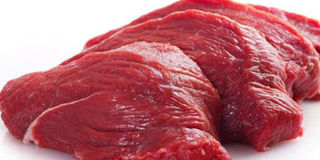Happening Now: Trump takes the lead in US presidential race
PS: Untreated animal products on the rise

A steak of meat. According to Dr Andrew Tuimur, the PS State Department of Livestock, there is an increase of cases of consumers eating untreated animal products. FILE PHOTO | NATION MEDIA GROUP
What you need to know:
- People are feeding on meat from sick animals and taking contaminated milk leading to diseases.
- Human-animal diseases are spread to human beings through consumption of unpasteurised milk or contaminated meat.
- These diseases are responsible for 2.2 million human deaths every year.
There is an increase of cases of consumers eating untreated animal products.
Dr Andrew Tuimur, the PS State Department of Livestock, said that people are feeding on meat from sick animals and taking contaminated milk leading to diseases.
He asked the county governments to increase inspection of meat.
“It is the responsibility of the counties to improve livestock health and ensure they eradicate diseases and the meat and milk sold in their regions is safe,” said Dr Tuimur this week during the Animal Production Society of Kenya Annual symposium held in Kisumu.
Dr Tuimur noted that the human-animal diseases classified as zoonosis spread to human beings through consumption of unpasteurised milk or contaminated meat.
VITAL TO THE COUNTRY'S ECONOMY
“Preventative treatment and vaccinations where appropriate can minimise the risk of some animal-borne diseases infecting people,” he said.
The diseases and pests, according to the PS include ringworm, tetanus, bird flu, hepatitis E, anthrax and tuberculosis. They are responsible for 2.2 million human deaths every year.
Most of the infections, he said, come from cattle, goats, sheep, chickens, camels and pigs with majority of the illnesses occurring in low and middle income countries, including Kenya.
Dr Tuimur said that the livestock sub-sector is vital to the country’s economy with its contribution to Kenya Gross Domestic Product ranging from 6 to 12 per cent.
He added that they were going to hold talks with livestock keeping counties, more so those in the North, to pilot animal insurance so that farmers can be able to treat their animals when sick.





